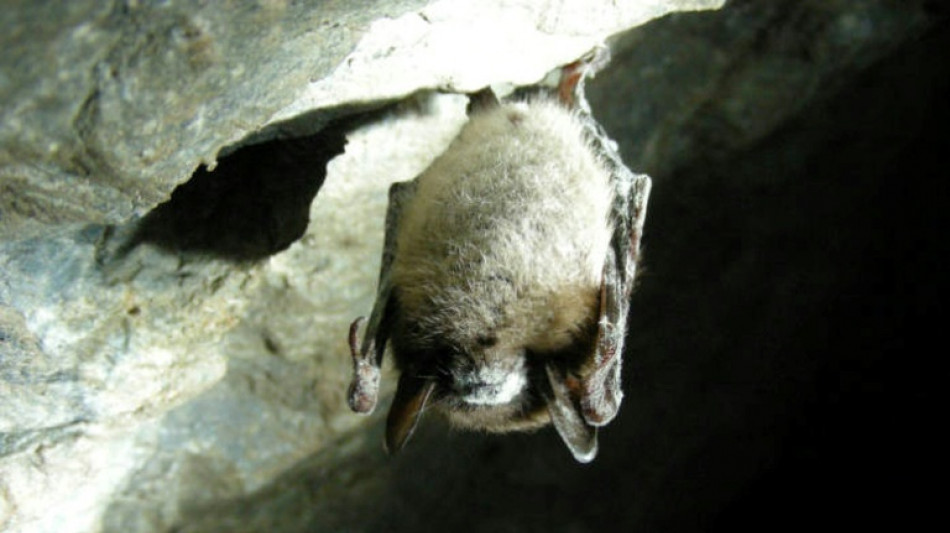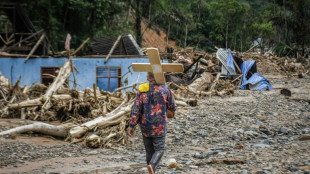
-
 Twenty wickets fall on day one as Australia gain edge in 4th Ashes Test
Twenty wickets fall on day one as Australia gain edge in 4th Ashes Test
-
'No winner': Kosovo snap poll unlikely to end damaging deadlock

-
 Culture being strangled by Kosovo's political crisis
Culture being strangled by Kosovo's political crisis
-
Main contenders in Kosovo's snap election

-
 Australia all out for 152 as England take charge of 4th Ashes Test
Australia all out for 152 as England take charge of 4th Ashes Test
-
Boys recount 'torment' at hands of armed rebels in DR Congo

-
 Inside Chernobyl, Ukraine scrambles to repair radiation shield
Inside Chernobyl, Ukraine scrambles to repair radiation shield
-
Bondi victims honoured as Sydney-Hobart race sets sail

-
 North Korea's Kim orders factories to make more missiles in 2026
North Korea's Kim orders factories to make more missiles in 2026
-
Palladino's Atalanta on the up as Serie A leaders Inter visit

-
 Hooked on the claw: how crane games conquered Japan's arcades
Hooked on the claw: how crane games conquered Japan's arcades
-
Shanghai's elderly waltz back to the past at lunchtime dance halls

-
 Japan govt approves record 122 trillion yen budget
Japan govt approves record 122 trillion yen budget
-
US launches Christmas Day strikes on IS targets in Nigeria

-
 Australia reeling on 72-4 at lunch as England strike in 4th Ashes Test
Australia reeling on 72-4 at lunch as England strike in 4th Ashes Test
-
Too hot to handle? Searing heat looming over 2026 World Cup

-
 Packers clinch NFL playoff spot as Lions lose to Vikings
Packers clinch NFL playoff spot as Lions lose to Vikings
-
Guinea's presidential candidates hold final rallies before Sunday's vote

-
 BondwithPet Expands B2B Offering with Custom Pet Memorial Product
BondwithPet Expands B2B Offering with Custom Pet Memorial Product
-
Best Crypto IRA Companies (Rankings Released)

-
 Eon Prime Intelligent Alliance Office Unveils New Brand Identity and Completes Website Upgrade
Eon Prime Intelligent Alliance Office Unveils New Brand Identity and Completes Website Upgrade
-
Villa face Chelsea test as Premier League title race heats up

-
 Spurs extend domination of NBA-best Thunder
Spurs extend domination of NBA-best Thunder
-
Malaysia's Najib to face verdict in mega 1MDB graft trial

-
 King Charles calls for 'reconciliation' in Christmas speech
King Charles calls for 'reconciliation' in Christmas speech
-
Brazil's jailed ex-president Bolsonaro undergoes 'successful' surgery

-
 UK tech campaigner sues Trump administration over US sanctions
UK tech campaigner sues Trump administration over US sanctions
-
New Anglican leader says immigration debate dividing UK

-
 Russia says made 'proposal' to France over jailed researcher
Russia says made 'proposal' to France over jailed researcher
-
Bangladesh PM hopeful Rahman returns from exile ahead of polls

-
 Police suspect suicide bomber behind Nigeria's deadly mosque blast
Police suspect suicide bomber behind Nigeria's deadly mosque blast
-
AFCON organisers allowing fans in for free to fill empty stands: source

-
 Mali coach Saintfiet hits out at European clubs, FIFA over AFCON changes
Mali coach Saintfiet hits out at European clubs, FIFA over AFCON changes
-
Last Christians gather in ruins of Turkey's quake-hit Antakya

-
 Pope Leo condemns 'open wounds' of war in first Christmas homily
Pope Leo condemns 'open wounds' of war in first Christmas homily
-
Mogadishu votes in first local elections in decades under tight security

-
 'Starting anew': Indonesians in disaster-struck Sumatra hold Christmas mass
'Starting anew': Indonesians in disaster-struck Sumatra hold Christmas mass
-
Cambodian PM's wife attends funerals of soldiers killed in Thai border clashes

-
 Prime minister hopeful Tarique Rahman arrives in Bangladesh: party
Prime minister hopeful Tarique Rahman arrives in Bangladesh: party
-
Pacific archipelago Palau agrees to take migrants from US

-
 Pope Leo expected to call for peace during first Christmas blessing
Pope Leo expected to call for peace during first Christmas blessing
-
Australia opts for all-pace attack in fourth Ashes Test

-
 'We hold onto one another and keep fighting,' says wife of jailed Istanbul mayor
'We hold onto one another and keep fighting,' says wife of jailed Istanbul mayor
-
North Korea's Kim visits nuclear subs as Putin hails 'invincible' bond

-
 Trump takes Christmas Eve shot at 'radical left scum'
Trump takes Christmas Eve shot at 'radical left scum'
-
3 Factors That Affect the Cost of Dentures in San Antonio, TX

-
 Leo XIV celebrates first Christmas as pope
Leo XIV celebrates first Christmas as pope
-
Diallo and Mahrez strike at AFCON as Ivory Coast, Algeria win

-
 'At your service!' Nasry Asfura becomes Honduran president-elect
'At your service!' Nasry Asfura becomes Honduran president-elect
-
Trump-backed Nasry Asfura declared winner of Honduras presidency


US bat decline triggered pesticide surge, 1,300 baby deaths: study
A collapse in North America's bat population led to a surge in pesticide use by farmers as an alternative way to protect crops from insects -- in turn triggering a rise in infant mortalities, a study revealed Thursday.
The paper, published in Science, provides concrete evidence supporting predictions that global biodiversity decline will have severe consequences for humans.
"Ecologists have been warning us that we're losing species left and right... and that will potentially have catastrophic impacts on humanity," author Eyal Frank, of the University of Chicago, told AFP.
"However, there was not a whole lot of empirical validation to those predictions because it is very hard to go and manipulate an ecosystem at a very large spatial scale," added the environmental economist.
- Bats are pest control -
For his work, Frank took advantage of a "natural experiment" -- the sudden emergence of a deadly bat disease -- to quantify the benefits that bug-eating bats provide in pest control.
White-nose syndrome (WNS), caused by an invasive fungus, began spreading across the United States from New York in 2006 -- killing bats by waking them during hibernation in winter, when they lack insects to feed on, and trying to stay warm saps their energy.
The loss of millions of bats shocked the ecosystem.
To investigate, Frank tracked the spread of WNS in the eastern US and compared insecticide use in affected counties versus unaffected ones.
He found a massive 31 percent increase in pesticide use where bat populations had declined.
Given the link between pesticides and poor health outcomes, Frank examined whether increased pesticide use correlated with higher infant mortality rates.
With more pesticides, the infant mortality rate rose by nearly eight percent, translating to 1,334 additional infant deaths since the bat disease took hold -- with contaminated water and air likely serving as pathways for the chemicals to enter humans.
Frank emphasized that the staggered spread of the wildlife disease supports his inference that the bat die-off directly caused the spike in infant mortality, rather than it merely being a coincidence that could be explained by other rural hardships such as drug abuse or poverty.
Any other explanation would have to align with the same expansion path and timing of WNS.
- Cascading impacts -
"We need better data on the presence of pesticides in the environment," Frank said, adding that his findings also underscore the need to protect bats.
Vaccines are being developed against WNS, but bats are also threatened by habitat loss, climate change and wind farms.
The new work adds to the body of evidence showing the cascading impacts of wildlife loss on ecosystems.
A recent study found that reintroducing wolves in Wisconsin reduced vehicle collisions with deer as wolves establish their patrols along highways.
In Central America, declines in amphibians and snakes have led to spikes in human malaria cases.
"Stemming the biodiversity crisis is crucial to maintaining the many benefits that ecosystems provide for which technological substitutes cannot readily, or perhaps, ever replace," scientists at the University of California, Santa Barbara and University of British Columbia wrote in a commentary.
"Studies like that of Frank are important for understanding the benefits of allocating scarce resources for biodiversity conservation."
D.Sawyer--AMWN


